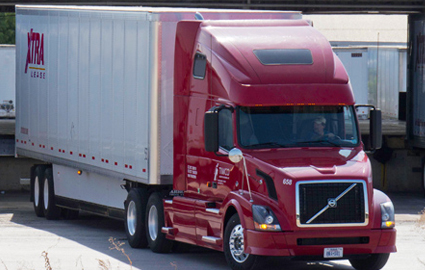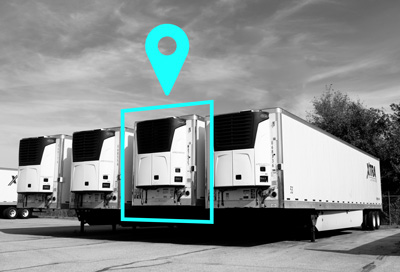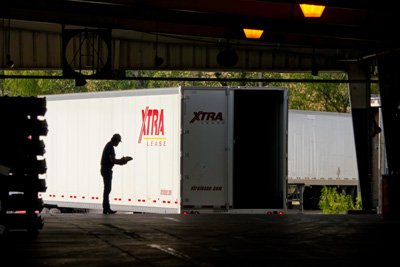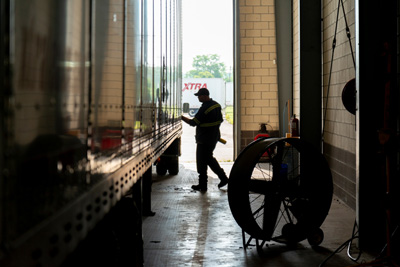
7 Benefits of Real-Time Trailer Tracking
Real-time trailer tracking can alert you when certain things happen that you need to know about. So, when it comes to trailer tracking, don't just set it and forget it.
Here are 7 things real-time trailer tracking helps you do to keep on top of your fleet:
- Prevent trailer misdirection.
- Locate missing trailers.
- Keep your drivers/agents efficient and profitable.
- Adhere to delivery windows.
- Avoid impound fees.
- Track loads after hours.
- Flag rented/leased trailers for preventive maintenance (PMs).
Don't just take our word for it.
Check out these real-life stories from our customers who use real-time trailer tracking to manage their supplemental trailers. There may be a tip you can put into effect for your fleet.
1. Real-time trailer tracking helps prevent trailer misdirection
It's common for trailers you own to get mixed in with those you're renting or leasing. An unfortunate side effect of this can be trailer misdirection. What's worse than a trailer you want to use only in Texas accidentally making its way to heavily regulated California?
Real-time trailer tracking combats misdirection.
A carrier for an online retailer uses alerts for that purpose. In the retailer's large yard, every now and then someone will hook up to the wrong trailer. So, the carrier's fleet manager sets tracking alerts that go to his mobile phone for trailers at the retailer's DC. The fleet manager knows immediately when a trailer leaves the DC area and can avoid the wrong route that used to keep him up at night.
Another carrier sets up alerts for trailers that are loaded with high-value freight. If the trailer moves out of a defined area unexpectedly, it's most likely being stolen. The real-time alert helps the carrier contact the authorities quickly.

2. Real-time trailer tracking helps locate missing trailers
Have you ever had to search for a misplaced rented or leased trailer?
A regional carrier was having trouble locating a trailer. Even though the trailer wasn't in their possession, they still were paying rent on it, so they were motivated to find that trailer.
Trailer tracking showed it in New Jersey. The satellite image on our tracking portal was key to recovering the errant 53-footer. We were able to enlarge the image enough to make out the phone number on a sign near the missing trailer, talk to the fleet manager who answered our call, and make a plan to get the trailer back.
An alert set for that trailer could have notified someone that the trailer had left its landmark and prevented such costly trouble.
3. Real-time trailer tracking keeps your resources efficient and profitable
There are almost four million Class 8 tractors in the U.S. and close to 12 million semi-trailers. That means about eight million trailers are idle at any given time.
A large logistics company uses real-time trailer tracking to monitor trailers they rent for one of their customers and park in that customer's yards. They don't want those trailers to sit idle for extended periods, racking up rental and storage fees.
And they want to ensure the trailers are being rotated, rather than one trailer being used over and over, thereby incurring out-of-the-ordinary wear and tear.
So, the logistics staff set up tracking alerts for those trailers. When a trailer moves out of the yard, an alert notifies the staff. If no alert arrives for a particular trailer in the time frame they're monitoring, the staff follows up with their customer to make sure that the trailer is still needed. If it isn't, they return it to us.
Why pay for trailers you don't need?

4. Real-time trailer tracking helps you adhere to delivery windows
Manufacturers who rely on just-in-time inventory need their carriers to honor set delivery windows. If they don't, a production line might have to shut down. And shutting down a line can mean that carrier never hauls for that manufacturer again.
An XTRA Lease customer who delivers to manufacturers uses notifications to help keep an eye on their leased trailers.
Notifications tell them when a trailer arrives or departs from specific checkpoints, such as a supplier facility or manufacturing plant. Because the alerts come in real-time, they can see whether their delivery is on schedule. If an alert isn't delivered within the expected time frame, they can intervene as soon as possible to find a way to deliver the shipment on time or to notify their customer when to expect the delivery.
5. Real-time trailer tracking helps you avoid impound fees
A large regional carrier uses our trailers to haul freight for a massive e-commerce company.
It's common for this e-commerce company to have unclaimed trailers sitting idle at their distribution centers. They try to find out who's responsible for the trailers, but, ultimately, it's the carrier's responsibility to keep control over the equipment.
Because errant trailers are such a common concern, the e-commerce company charges four-figure impound fees.
Recently the company impounded one of our customer's rental trailers because it had been sitting at a DC for more than 30 days.
Because of that expensive experience, the carrier set up a notification for each trailer they use for that customer to tell them when the trailer has entered or left the customer's DC. They keep a close eye on those trailers to prevent the hassle and fees of any more impounds.
6. Real-time trailer tracking tracks loads after hours
A nationwide carrier sometimes needs to track an important load after hours. They set up a tracking notification that goes to a transportation manager's cell phone and email to identify when that load arrives at its destination. If the notification doesn't come at the expected time, they know something isn't going to plan. Then they can act promptly, rather than wait until the next business day to deal with a problem that needs immediate attention.
As part of a hurricane relief effort, a carrier dropped trailers for FEMA at an Air Force base in Texas. When FEMA finished with the trailers at 11 pm, they said to move them right away or they'd be towed. The carrier sent drivers to pick up the trailers and set up alerts to go to their equipment manager's cell phone so they'd see right when the trailers moved off the base. This helped them be sure their drivers, not a towing company, moved the trailers off the base and prevented towing fees.

7. Real-time trailer tracking helps you flag trailers for PMs
Tracking notifications can help you schedule maintenance based on actual trailer usage.
Many of our customers have rental trailers that we provide preventive maintenance for. Going to our website and requesting a report on trailers due for those PMs takes time. Sometimes it's more efficient to get precise information about specific trailers in real time when they arrive or leave a specific location.
One of our customers sets a notification on every trailer due for a PM. The notification tells them when that trailer arrives at a delivery location that's close to one of our branches. When they get the message, they contact the driver to ask, "When you drop off your load, can you run the trailer over to the branch for a PM?"
There you have it! Real-life examples of using real-time trailer tracking to better manage your supplemental trailers and keep costs in line.